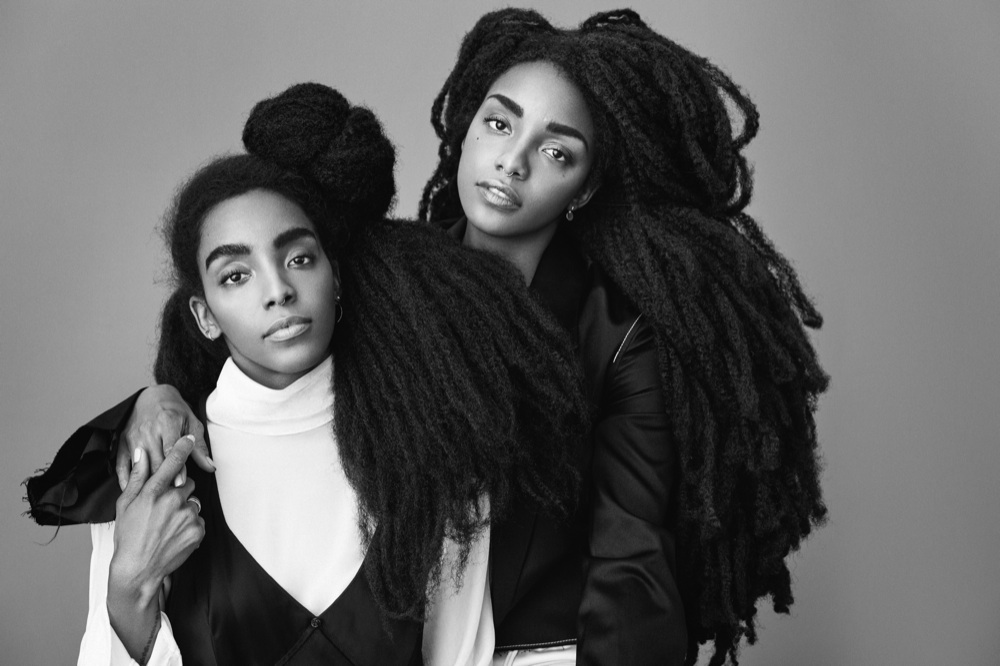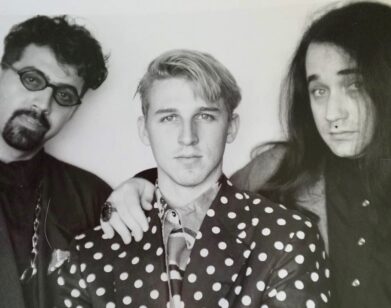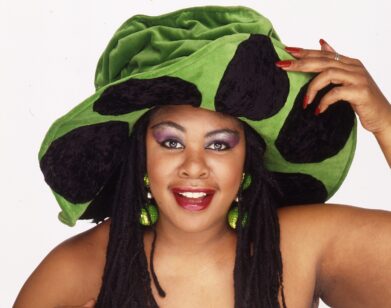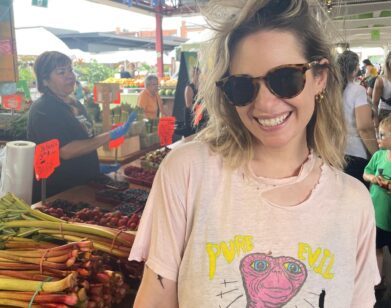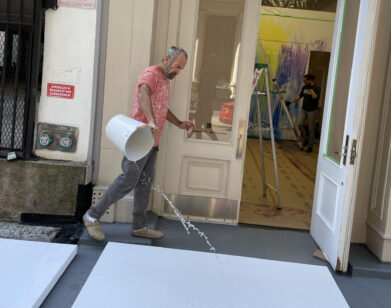Sister, Sister
CIPRIANA AND TK QUANN IN NEW YORK, MARCH 2016. PHOTOS: ELLINOR STIGLE. STYLING:KAROLINA BROCK. HAIR: YUHI KIM/ BRIDGE ARTISTS. MAKEUP: YUCO AOKI. PHOTO ASSISTANT: GRACE MCGOWEN. STYLING ASSISTANT: MARCUS LESLIE. SET DESIGN: OBJECTS IN GENERAL. RETOUCHING: RETOUCHED STUDIOS
When stationed between twin sisters Cipriana and TK Quann, you’ll find yourself swiveling your head between their identical faces as they volley off each other verbally. You’ll wonder where exactly they got it—”it” being the conviction and comfort that it takes to piece together two careers from all manner of risky creative interests, and to consistently speak out about race in a fashion industry that is never super keen on hearing about it.
Ask them, and they’ll reply immediately (and in unison): “It’s our mother.” Cipriana is quick to clarify, “She wasn’t sitting down and teaching us lessons or anything, but just looking at her every day was such a huge influence.” By their count, she taught them by example about the beauty of natural hair, the importance of personal style, the right to confront racism where they see it, the special tenacity it takes to find and make a meaningful career for oneself—all “lessons” that crop up again a little while later when they talk about the values they try to promote at Urban Bush Babes. The site, which Cipriana founded five years ago with her friend Nikisha Brunson, and where TK works as an executive contributor, has amassed both of them a sizeable social following, on-the-list status at every fashion-press event in New York, and a contract with IMG that’s landed them campaign for brands like Gap, & Other Stories, and Rebecca Minkoff.
On the side, they work with organizations like the Boys and Girls Club, helping high schoolers pick out their prom wear, and with 13th Floor Storytellers, who host spaces for foster care survivors to share their stories with each other and the outside world. TK also works as a musician under the stage name TK Wonder, touring Europe every summer for the past few years with her Macedonian collaborator, composer Kiril Dzajkovski. When she’s in town—she’s leaving any day now, just in time for festival season—she works on her own brand of hip-hop-inflected electronic music.
And then there’s a new project: together TK and Cirpriana are working, somewhat secretively, on an “online presence” dedicated just to food and drink. The night we met up with them at a hotel bar in Greenwich Village, they’d just come from a day full of tastings for said project. Very varied lives they lead.
ZACHARY ETHEART: How often do you two get to see each other?
CIPRIANA QUANN: [laughs] We probably see each other three or four times a week, but we talk—
TK QUANN: —every day, multiple times a day.
CIPRIANA: Every time we see each other we’re working, but it doesn’t feel like work because we enjoy it so much. It just feels like hanging out. Even though it is hard work—I don’t want to make it sound like it’s not hard work—it’s so much easier because we’re best friends. It’s so easy.
TK: Definitely. It took us a long time and a lot of jobs to get to a point where work was this fun.
ETHEART: When you’re juggling so many different projects and interests, how do you pick what new things to take on? What’s your filter?
TK: We’re honestly the kind of people who only work with a brand or a product if it resonates with us. That’s what we want our audience to know: We’re not going to do something just because we’re offered a certain amount of money, and there are a lot of things we don’t get paid for, but we cover it or give attention to it because we really believe in the person or the product or the message.
CIPRIANA: I also think we love having creative control. I think that’s what’s changed over the years. We were just having this discussion earlier today. Sometimes you have to be very multi-faceted in what you do; you have to be your own makeup artist, your stylist, the creative director… I think that’s a very fun part of the process, and we love to work with brands that give you a kind of guideline, but say, “You take it from there.” I love that, when people see your work and give you all of this creative freedom. That’s very important to us, because we don’t want anyone to dictate our work to us or set these rigid guidelines around the creative process.
TK: And just to tail-end on that, when I was younger, I hated modeling. I despised it. I can honestly say I despised it. But for me, now, modeling is fun because it’s a collaboration. It’s very interesting to be on set, and they’ll be like, “What do you think about this? Would you want to wear this?” I can honestly say that we’ve collaborated with a few companies and been like, “Look, we’re not comfortable with doing that, but we’ll do this.” You should never be afraid to say no. “No” is not a bad thing. “No” is a good thing when you’re confident in yourself and you don’t conform to what someone else thinks you should be.
CIPRIANA: I think that’s what was really great about signing with IMG. Before we signed with them we had a meeting, and they talked about the industry and how they loved bringing more diversity into it. They were like, “We love what you guys do and we think the industry really needs it,” which was great to hear because when I was first modeling, things weren’t like that at all. You had to show up on the job and do what everyone told you to do.
ETHEART: Cipriana, what was it that drove you to start Urban Bush Babes with Nikisha? What role did you see it playing that wasn’t being served by other media?
CIPRIANA: Urban Bush Babes was always about creating a platform where women of color could feel comfortable being themselves. So we wanted to show the multifaceted lives of different women—you know, we’re chefs, we’re lawyers, we’re students, we’re doctors, we like Pink Floyd, we could be in the middle of the woods fishing… We just wanted to show different examples of what wasn’t being shown in mainstream media. And it kind of blossomed into much more than just women of color. The unifying message of it is to be who you are and love yourself, because when you love yourself, you’re able to do anything. Just imagine if everyone in the world loved themselves and they were doing what they loved. This would be a very different world today. So we wanted to promote that platform and do it while showing a different side of beauty and fashion, and showing it in a more diverse way.
TK: The platform, I think, is that diversity is beauty and it’s no longer the minority. Our country is more diverse than it’s ever been, and I think that so many companies are set in their ways of promoting the same sort of images when “all-American” beauty is no longer just blue eyes and blond hair. But sometimes companies hold onto this old ideology and this old way of thinking about an American beauty that no longer exists. So I think it’s really important to encourage this message of diversity. And people are sometimes like “Ugh, you know, diversity.” But I mean, if you’re tired of hearing it… When it changes, I’ll get tired of saying it.
ETHEART: There’s definitely a lot of talk of progress around race and diversity in fashion, especially in the last few years. But the gains can seem so small. Do you think things are improving in any significant way?
CIPRIANA: It’s changing slowly, but it’s definitely changing. Sometimes we’ll go to events or dinners and we’ll be the only people of color there. Or sometimes we’ll be up for certain jobs and a brand—I won’t name the brand—will say we were this close to getting it but they didn’t think we were relatable to middle America, which is ridiculous, because a lot of times when we do get featured by a certain brand, our numbers are very high. I think people are stuck in this old way of thinking that diversity is not relatable to middle America. It’s ridiculous.
TK: When they say something along those lines, sometimes I think there’s a little bit of validity to it. Middle America, in my opinion—or some states—do have a very far way to come when it comes to promoting and encouraging diversity. Some states in the South are very backwards in the way they think about it. I think this is a tumultuous time, especially when you see Trump running and you see how many people are out supporting this man who doesn’t support diversity, who has this idea of blocking off immigrants when this country was built on the support and hard work of immigrants. I think the whole ideology of promoting diversity is not strong in middle America, I do believe that. But at the same time, as a large company, you can’t think like that. You can’t change things until you make a change. Be the first person who walks in and says, “This is what I’m going to do. I’m going to promote diversity, I’m going have this model of color and this model of color promote this brand.” Then you’re the one who’s making a change. There can never be any change if you keep saying it doesn’t relate.
ETHEART: What brands and designers are you really into currently?
TK: We have a few, for sure. Tome, Mara Hoffman, Baja East, Jonathan Cohen…
CIPRIANA: Studio 189, Rebecca Minkoff…
TK: And actually, also, Balenciaga and Ferragamo. They’ve been really cool about diversifying a little bit.
ETHEART: You mentioned earlier you had a favorite spot for vintage shopping in the city.
CIPRIANA: Yes! Well we love Beacon’s Closet and L Train, which is this other vintage spot. But our ultimate favorite is this placed called 28 Scott. It’s amazing; the owner is one of our good friends and she has the most amazing taste in finding the best vintage clothes. True vintage stuff. And it’s nice because it’s like a hangout spot; people will go there and she’ll just be like, “Do you want wine? Or whiskey?” For free. And people sometimes just come and chill out and she plays music. It’s so nice.
ETHEART: Part of me thinks I shouldn’t publish that and that it should stay a secret.
TK: [laughs] Oh, no. We’re all about sharing. You know how some women, you’ll be like “Oh, I love your skirt!” And they’ll just be like “Oh… thanks!” without saying where they got it?
ETHEART: Or people swear they can’t remember where they got something. You definitely remember.
CIPRIANA: [laughs] Yes, yes. “Oh, it was so long ago!” No, you remember… With me, you don’t even have to ask. If someone says they like something, I voluntarily give up where I got it, how much it costs, all that.
YOU CAN VISIT THE URBAN BUSH BABES WEBSITE HERE.

